复数可数名词. PLURAL COUNTABLE NOUNS
- 格式:docx
- 大小:26.46 KB
- 文档页数:23
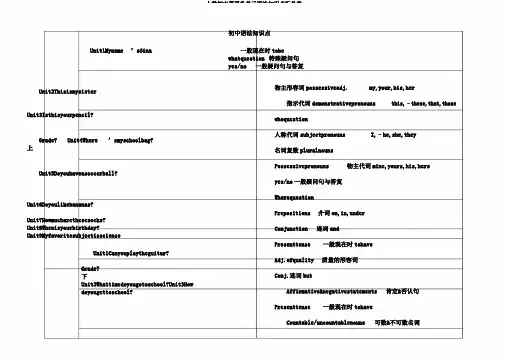
Unit1Myname ’sGinaUnit2ThisismysisterUnit3Isthisyourpencil?Grade7 Unit4Where ’smyschoolbag?上Unit5Doyouhaveasoccerball?Unit6Doyoulikebananas?Unit7Howmucharethesesocks?Unit8Whenisyourbirthday?Unit9MyfavoritesubjectisscienceUnit1Canyouplaytheguitar?Grade7下Unit2Whattimedoyougotoschool?Unit3Howdoyougettoschool?初中语法知识点一般现在时tobewhatquestion 特殊疑问句yes/no 一般疑问句与答复物主形容词possessiveadj.my,your,his,her指示代词demonstrativepronouns this,–these,that,those whoquestion人称代词subjectpronouns I,–he,she,they名词复数pluralnounsPossessivepronouns物主代词mine,yours,his,hersyes/no一般疑问句与答复WherequestionPrepositions介词on,in,underConjunction连词andPresenttense一般现在时tohaveAdj.ofquality质量的形容词Conj.连词butAffirmative&negativestatements肯定&否认句Presenttense一般现在时tohaveCountable/uncountablenouns可数&不可数名词Affirmative&negativestatements肯定&否认句Howmuch疑问句When疑问句Possessive所有格‘sWhat,why,when,who疑问句Modalverb情态动词canwhat疑问句Whattime疑问句When疑问句Adverbsof frequency频率副词always,often,usually, never等How,howlong,howfar疑问句Unit4Don ’teatinclassUnit5Whydoyoulikepandas?Unit6I ’mwatchingTVUnit7It ’sraining!Unit8isthereapostofficeoverhere?Unit9Whatdoeshelooklike?Unit10I ’dlikesomenoodlesUnit11Howwasyourschooltrip?Unit12Whatdidyoudolastweekend?Unit1Wheredidyougoonvacation?Grade8上Unit2Howoftendoyouexercise?Imperatives祈使句Don’tCanforpermission允modalverb情haveto,mustWhy,what,where疑句wherearekoalasfrom?Because⋯Adj.ofquality量的形容Presentprogressivetense在行What疑句whatareyoudoing?Presentprogressivetense在行How提howisitgoing?Howistheweather?What提whataretheydoing?Therebe构Where疑句方位介prepositionsofplace:infrontof,onyourleft⋯What疑句whatdoeshelooklike?Adjectivesofdescription描述外表形容straight,tall, thin,heavy,round,handsome等Alternativequestions疑句ishetallorshort?WouldlikeWhat疑句whatsizewouldyoulike?Some/anySimplepasttense一般去How疑句Howwasyourschooltrip?Adj.ofdescription描述性形容excellent,interesting, terrible等Simplepasttense一般去What疑句Whatdidyouplaywith?How疑句howwasyourweekend?Indefinitepronouns 不定代Simplepasttenseofregular&irregularverbs 及物&不及物一般去Howoften⋯?疑句Adv.offrequency 率副sometimes, usually,often,Unit3I ’mmoreoutgoingthanmysister.Unit4What ’sthebestmovietheater?Unit5Doyouwanttowatchagameshow?Unit6I ’mgoingtostudycomputerscienceUnit7Willpeoplehaverobots?never,onceamonth比Comparativeswith–(i)er&moreboth&as⋯as⋯最高Superlativeswith–(i)est&themost不化:good-better-best;bad-worse-worstInfinitivesusedasobjects不定式todo一般将来Futurewithbegoingtowanttobe一般将来FuturewithwillwanttobeImperatives 祈使句Grad e8 下Unit8Howdoyoumakeabananamilkshake?Howmuch/howmany疑句Countable/uncountablenounsAdverbsofsequence:first,nest,then,finally Unit9Canyoucometomyparty?Canforinvitations情Modalverb mightUnit10Ifyougototheparty,youFirstconditional第一/真条件句if+will’llhaveagreattime!should情ModalverbModalverbs should/shouldn’tforsuggestionsUnit1What’sthematter?Reflexive pronouns反身代myself,yourself,themselves,yourselvesInfinitivesasobject,adverbialandobjectcomplement不定式,状和缺乏Unit2I’llhelptocleanupthecityparksModalverb couldforsuggestionsPhrasalverbs短CouldforpoliterequestsUnit3Couldyoupleasecleanyourroom?CouldforpermissionWhydon’tyou⋯?Unit4Whydon’tyoutalktoyourparents?Conjunctions until,sothatandalthoughConjunctions whenandwhileUnit5Whatwereyoudoingwhentherainstormcame?Questionsandstatementswiththepastprogressivetense去行Unit6AnoldmantriedtomovethemountainsUnit7What ’sthehighestmountainintheworld?Unit8HaveyoureadTreasureIslandyet?Unit9Haveyoueverbeentoamuseum?Unit10I ’vehadthisbikefor3yearsUnit1Howcanwebecomegoodlearners?Unit2Ithinkthatmooncakesaredelicious!Unit3Couldyoupleasetellmewheretherestroomsare?Unit4IusedtobeafraidofthedarkUnit5Whataretheshirtsmadeof?Unit6Whenwasitinvented?Unit7Teenagersshouldbeallowedtochoosetheirownclothes Grade9Unit8ItmustbelongtoCarlaUnit9IlikemusicthatIcandancetoUnit10You ’resupposedtoshakehandsUnit11SadmoviesmakemecryUnit12LifeisfulloftheunexpectedUnit13We’retryingtosavetheearth!Unit14IremembermeetingallofyouinGrade7Conjunctions unless,assoonas andso⋯that LargenumbersComparativesandsuperlativeswithadj.&adv. 比急,最高Presentperfecttensewith already&yet Presentperfecttensewith been,ever&never Presentperfecttensewith since&forVerb+bywithgerund+bydoingsth.名,通⋯Objectiveclausewith that,ifandwhether从句Exclamatorystatement感句how&what Objectiveclauseswith wh-questions wh-引从句Usedto 去常常Passivevoice(presenttense) 被一般在Passivevoice(pasttense) 被一般去Should+beallowedtodosth.Must,might,could&can making’tinferences做推断Relativeclauseswith that,whoandwhich 关系从句Supposedto+infinitive 不定式Expectedto+infinitive 不定式Itis+adj.+infinitiveMake+sb.+infinitivewithout toMake+sb.+adj.Pastperfecttense 去完成式ReviewReview。
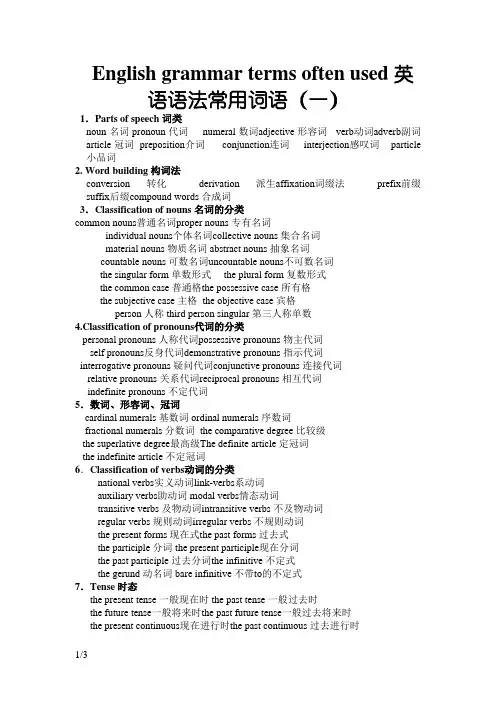
English grammar terms often used 英语语法常用词语(一)1.Parts of speech 词类noun 名词 pronoun 代词 numeral 数词adjective 形容词 verb动词adverb副词article 冠词 preposition介词 conjunction连词 interjection感叹词 particle 小品词2. Word building 构词法conversion 转化derivation 派生affixation词缀法prefix前缀suffix后缀compound words 合成词3.Classification of nouns 名词的分类common nouns普通名词proper nouns 专有名词individual nouns个体名词collective nouns 集合名词material nouns 物质名词 abstract nouns 抽象名词countable nouns 可数名词uncountable nouns不可数名词the singular form 单数形式 the plural form 复数形式the common case 普通格the possessive case 所有格the subjective case 主格 the objective case 宾格person 人称 third person singular 第三人称单数4.Classification of pronouns代词的分类personal pronouns 人称代词possessive pronouns 物主代词self pronouns反身代词demonstrative pronouns 指示代词interrogative pronouns 疑问代词conjunctive pronouns 连接代词relative pronouns 关系代词reciprocal pronouns 相互代词indefinite pronouns 不定代词5.数词、形容词、冠词cardinal numerals 基数词 ordinal numerals 序数词fractional numerals 分数词 the comparative degree 比较级the superlative degree最高级The definite article 定冠词the indefinite article 不定冠词6.Classification of verbs动词的分类national verbs实义动词link-verbs系动词auxiliary verbs助动词 modal verbs情态动词transitive verbs 及物动词intransitive verbs 不及物动词regular verbs 规则动词irregular verbs 不规则动词the present forms 现在式the past forms 过去式the participle 分词 the present participle现在分词the past participle 过去分词the infinitive 不定式the gerund 动名词 bare infinitive 不带to的不定式7.Tense 时态the present tense 一般现在时 the past tense 一般过去时the future tense一般将来时the past future tense一般过去将来时the present continuous现在进行时the past continuous 过去进行时the future continuous 将来进行时 the past future continuous过去将来进行时the present perfect 现在完成时the past perfect过去完成时the future perfect 将来完成时the past future perfect 过去将来完成时the present perfect continuous现在完成进行时the future perfect continuous 将来完成进行时the past future perfect continuous 过去将来完成进行时8.Voice 语态、Mood 语气the passive voice 被动语态the active voice 主动语态the indicative mood 陈述语气the imperative mood 祈使语气the subjunctive mood 虚拟语气9.Classification of adverbs副词的分类adverbs of place 地点副词adverbs of time 时间副词adverbs of degree程度副词adverbs of manner 方式副词adverbs of frequency频度副词relative adverbs 关系副词interrogative adverbs 疑问副词 conjunctive adverbs连接副词10. Members of the sentence 句子成分the subject 主语the predicate 谓语the predicative 表语the object 宾语the attribute 定语the adverbial 状语 the appositive 同位语independent elements 成分the direct object 直接宾语the indirect object 间接宾语 parenthesis 插入语the double possessive 双重所有格the formal subject/object 形式主语/宾语subject complement 主语补足语 object complement 宾语补足语11.Classification of sentences句子的分类declarative sentences 陈述句 imperative sentences 祈使句exclamatory sentences感叹句interrogative sentences 疑问句general questions 一般疑问句 special questions 特殊疑问句alternative questions选择疑问句 disjunctive questions 反意疑问句tap questions 附加疑问句 simple sentences 简单句compound sentences 复合句 complex sentences 并列句elliptical sentences 省略句 phrase 短语 preposition phrases 介词短语 infinitive phrases 不定式短语 the question word 疑问词12.Clauses 从句main clauses 主句subject clauses 主语从句object clauses宾语从句direct speech 直接引语indirect speech 间接引语predicate clauses 谓语从句predicative clauses 表语从句 attributive clauses定语从句restrictive attributive clauses 限定性定语从句theantecedent 先行词non-restrictive attributive clauses 非限定性定语从句appositive clauses同位语从句adverbial clauses状语从句adverbial clauses oftime/place/cause/condition/degree/result/concession/purpose/comparison /manner 时间/地点/原因/条件/程度/结果/让步/目的/比较/方式状语从句sentences of real condition真实条件句sentences of unreal condition 虚拟条件句natural word-order 自然语序inverted word-order 倒装语序full inversion 完全倒装partial inversion 部分倒装ellipsis 省略transformation of sentences 句型转换analysis of sentences 句子分析13. Punctuation 标点符号period/full stop 句号comma 逗号semicolon分号colon 冒号dash 破折号hyphen连字号brackets 括号question mark 问号quotation marks 引号apostrophe省略号14.The pronunciation of English 英语发音international phonetic国际音标 the sounds of English 英语语音vowels 元音pure vowels 单元音diphthongs 双元音semi-vowel 半元音consonants 辅音nasal 鼻音plosive 爆破音fricative磨擦音affricate 破擦音voiced sounds浊音 voiceless 清音length mark 长音符号stress 重读main stress 主重读音节secondary stress 次重读音节 unstressed 非重读音节rhythm 节奏 intonation 语调a level pitch 平调rising tune 升调falling tune 降调。
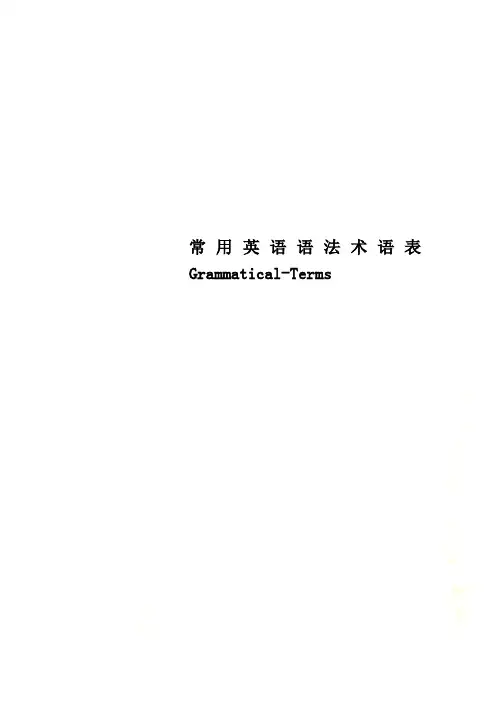
常用英语语法术语表Grammatical-Terms常用英语语法术语表Grammatical Terms 1. 语法grammar句法syntax词法morphology结构structure句子sentence从句clause词组phrase词类part of speech实词notional word虚词structural word单纯词simple word派生词derivative复合词compound词性part of speech名词noun专有名词proper noun普通名词common noun可数名词countable noun不可数名词uncountable noun抽象名词abstract noun具体名词concret noun物质名词material noun集体名词collective noun个体名词individual noun介词preposition连词conjunction动词verb主动词main verb及物动词transitive verb不及物动词intransitive verb 系动词link verb助动词auxiliary verb情态动词modal verb规则动词regular verb不规则动词irregular verb 短语动词phrasal verb限定动词finite verb非限定动词infinite verb使役动词causative verb感官动词verb of senses动态动词event verb静态动词state verb感叹词exclamation形容词adjective副词adverb方式副词adverb of manner程度副词adverb of degree时间副词adverb of time地点副词adverb of place修饰性副词adjunct连接性副词conjunct疑问副词interogative adverb关系副词relative adverb代词pronoun人称代词personal pronoun物主代词possesive pronoun反身代词reflexive pronoun相互代词reciprocal pronoun指示代词demonstrative pronoun疑问代词interrogative pronoun关系代词relative pronoun不定代词indefinite pronoun物主代词possecive pronoun名词性物主代词nominal possesive prnoun形容词性物主代词adjectival possesive pronoun冠词article定冠词definite article不定冠词indefinite article数词numeral基数词cardinal numeral序数词ordinal numeral分数词fractional numeral形式form单数形式singular form复数形式plural form限定动词finite verb form非限定动词non-finite verb form 原形base form2.morphology词法notional实词form word虚词word-building构词法root词根prefix前缀suffix后缀synonym同义词antonym反义词conversion转化法derivation派生法affixation词缀法composition合成法compound复合词parts of speech词类noun名词pronoun代词numeral数词adjective形容词verb动词adverb副词article冠词preposition介词conjunction连词interjection感叹词particle引导词classification of nouns名词的分类common noun普通名词proper noun专有名词collective noun集合名词material noun物质名词abstract noun抽象名词countable noun可数名词personal pronoun人称代词possessive pronoun物主代词reflexive pronoun反身代词demonstrative pronoun指示代词interrogative pronoun疑问代词relative pronoun关系代词indefinite pronoun不定代词reciprocal pronoun相互代词case格nominative case主格objective case宾格possessive case所有格singular form单数形式plural form复数形式cardinal numeral基数词ordinal numeral序数词fraction numeral分数数词degrees of comparison比较级positive degree原级comparative degree比较级superlative degree最高级notional verb实义动词modal verb情态动词link verb连系动词auxiliary verb助动词transitive verb及物动词intransitive verb不及物动词regular verb规则动词irregular verb不规则动词finite verb限定动词non-finite verb非限定动词person人称number数gender性tense时态voice语态mood语气principal forms of verbs动词的主要形式present form现在形式past form过去形式participle分词present participle现在分词past participle过去分词infinitive不定式gerund动名词verbal noun动名词simple present tense一般现在时simple past tense一般过去时simple future tense一般将来时present continuous tense现在进行时past continuous tense过去进行时future continuous tense将来进行时past perfect tense过去完成时future perfect tense将来完成时present perfect continuous tense现在完成进行时future perfect continuous tense将来完成进行时sequence of tenses时态的呼应passive voice被动语态active voice主动语态indicative mood陈述语气imperative mood祈使语气subjunctive mood虚拟语气adverb of time 时间副词adverb of place地点副词adverb of manner方式副词adverb of degree程度副词adverb of frequency频度副词conjunctive adverb连接副词definite article定冠词indefinite article不定冠词coordinating conjunction并列连词subordinating conjunction从属连词syntax句法declarative sentence陈述句imperative sentence祈使句exclamatory sentence感叹句interrogative sentence疑问句general question一般疑问句special question特殊疑问句alternative question选择疑问句disjunctive question反意疑问句simple sentence简单句compound sentence并列句语法术语Grammar Terms 语法grammar句法syntax词法morphology结构structure句子sentence从句clause词组phrase词类part of speech实词notional word虚词structural word名词noun专有名词proper noun普通名词common noun可数名词countable noun不可数名词uncountable noun 抽象名词abstract noun具体名词concrete noun物质名词material noun集体名词collective noun个体名词individual noun介词preposition连词conjunction动词verb主动词main verb及物动词transitive verb不及物动词intransitive verb 系动词link verb助动词auxiliary verb情态动词modal verb规则动词regular verb不规则动词irregular verb短语动词phrasal verb限定动词finite verb非限定动词infinite verb使役动词causative verb感官动词verb of senses动态动词event verb静态动词state verb感叹词exclamation形容词adjective副词adverb方式副词adverb of manner程度副词adverb of degree时间副词adverb of time地点副词adverb of place修饰性副词adjunct连接性副词conjunct疑问副词interrogative adverb 关系副词relative adverb代词pronoun人称代词personal pronoun物主代词possessive pronoun 反身代词reflexive pronoun相互代词reciprocal pronoun指示代词demonstrative pronoun疑问代词interrogative pronoun关系代词relative pronoun不定代词indefinite pronoun名词性物主代词nominal possessive pronoun形容词性物主代词adjectival possessive pronoun冠词article定冠词definite article不定冠词indefinite article数词numeral基数词cardinal numeral序数词ordinal numeral分数词fractional numeral形式form单数形式singular form复数形式plural form限定动词finite verb form非限定动词non-finite verb form原形base form从句clause从属句subordinate clause并列句coordinate clause名词从句nominal clause定语从句attributive clause状语从句adverbial clause宾语从句object clause主语从句subject clause同位语从句appositive clause时间状语从句adverbial clause of time地点状语从句adverbial clause of place方式状语从句adverbial clause of manner让步状语从句adverbial clause of concession原因状语从句adverbial clause of cause结果状语从句adverbial clause of result目的状语从句adverbial clause of purpose条件状语从句adverbial clause of condition真实条件状语从句adverbial clause of real condition非真实条件状语从句adverbial clause of unreal condition 含蓄条件句adverbial clause of implied condition错综条件句adverbial clause of mixed condition句子sentence简单句simple sentence并列句compound sentence复合句complex sentence并列复合句compound complex sentence 陈述句declarative sentence疑问句interrogative sentence一般疑问句general question特殊疑问句special question选择疑问句alternative question附加疑问句tag question反义疑问句disjunctive question修辞疑问句rhetorical question感叹疑问句exclamatory question存在句existential sentence肯定句positive sentence否定句negative sentence祈使句imperative sentence省略句elliptical sentence感叹句exclamatory sentence基本句型basic sentence pattern句子成分members of sentences主语subject谓语predicate宾语object双宾语dual object直接宾语direct object间接宾语indirect object复合宾语complex object同源宾语cognate object补语complement主补subject complement宾补object complement表语predicative定语attribute同位语appositive状语adverbial句法关系syntactic relationship 并列coordinate从属subordination修饰modification前置修饰pre-modification后置修饰post-modification限制restriction双重限制double-restriction非限制non-restriction数number单数形式singular form复数形式plural form规则形式regular form不规则形式irregular form格case普通格common case所有格possessive case主格nominative case宾格objective case性gender阳性masculine阴性feminine通性common中性neuter人称person第一人称first person第二人称second person第三人称third person时态tense过去将来时past future tense过去将来进行时past future continuous tense过去将来完成时past future perfect tense一般现在时present simple tense一般过去时past simple tense一般将来时future simple tense现在完成时past perfect tense过去完成时present perfect tense将来完成时future perfect tense现在进行时present continuous tense过去进行时past continuous tense将来进行时future continuous tense过去将来进行时past future continuous tense现在完成进行时present perfect continuous tense 过去完成进行时past perfect continuous tense语态voice主动语态active voice被动语态passive voice语气mood陈述语气indicative mood祈使语气imperative mood虚拟语气subjunctive mood否定negation否定范围scope of negation全部否定full negation局部否定partial negation转移否定shift of negation语序order自然语序natural order倒装语序inversion全部倒装full inversion部分倒装partial inversion直接引语direct speech间接引语indirect speech自由直接引语free direct speech自由间接引语free indirect speech一致agreement主谓一致subject-predicate agreement 语法一致grammatical agreement概念一致notional agreement就近原则principle of proximity强调emphasis重复repetition语音pronunciation语调tone升调rising tone降调falling tone降升调falling-rising tone文体style正式文体formal非正式文体informal口语spoken/oral English感情色彩emotional coloring 褒义commendatory贬义derogatory幽默humorous讽刺sarcastic挖苦ironic。
![什么是名词代词动词副词形容词介词数词[技巧]](https://uimg.taocdn.com/6114cd8ca26925c52dc5bf99.webp)
什么是名词代词动词副词形容词介词数词[技巧] 什么是名词代词动词副词形容词介词数词1,名词,Nouns (n.) 表示人或事物的名称 box, pen,tree,apple2,代词,Pronouns (pron.)代替名词、数词、形容词We, this, them,myself 3,形容词, Adjectives(adj.) 用来修饰名词,表示人或事物的特征 good, sad, high, short4,数词,Numerals(num.)表示数目或顺序 one,two, first5,动词,Verb (v.) 表示动作或状态 Jump,sing,visit6,副词,Adverbs(adv.) 修饰动、形、副等词,表示动作特征there,widely,suddenly7,冠词,Articles (art.) 用在名词前,帮助说明名词所指的范围 a, an,the8,介词,Prepositions (prep.) 用在名词或代词前,说明它与别的词的关系in,on,down,up9,连词,Conjunctions (conj.) 表示人或事物的名称if,because,but10,感叹词, Interjections (int.) 代替名词、数词、形容词等prep = 介词;前置词,preposition的缩写 pron = 代词,pronoun的缩写n = 名词,noun的缩写v = 动词,兼指及物动词和不及物动词,verb的缩写conj = 连接词,conjunction的缩写 vi = 不及物动词,intransitive verb 的缩写 vt = 及物动词,transitive verb的缩写 aux.v = 助动词,auxiliary的缩写 adj = 形容词,adjective的缩写 adv= 副词,adverb的缩写art = 冠词,article的缩写num = 数词,numeral的缩写int = 感叹词,interjection的缩写 u = 不可数名词,uncountable noun的缩写 c = 可数名词,countable noun的缩写 pl = 复数,plural的缩写英语句子成分有主语,谓语,表语,宾语,宾语补足语,定语,状语等。
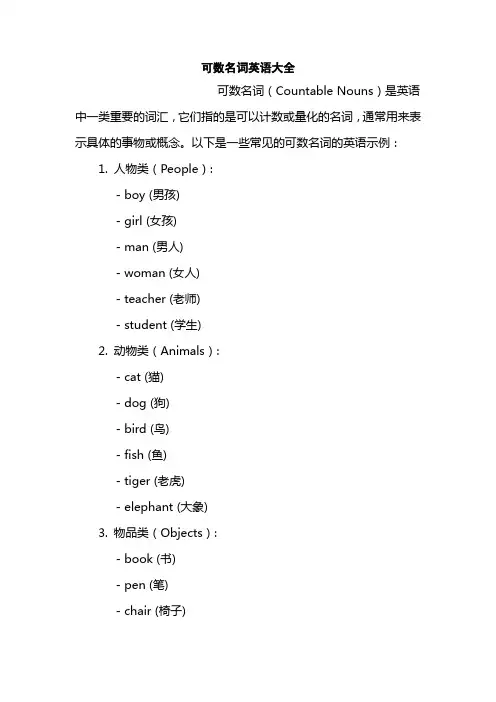
可数名词英语大全可数名词(Countable Nouns)是英语中一类重要的词汇,它们指的是可以计数或量化的名词,通常用来表示具体的事物或概念。
以下是一些常见的可数名词的英语示例:1. 人物类(People):- boy (男孩)- girl (女孩)- man (男人)- woman (女人)- teacher (老师)- student (学生)2. 动物类(Animals):- cat (猫)- dog (狗)- bird (鸟)- fish (鱼)- tiger (老虎)- elephant (大象)3. 物品类(Objects):- book (书)- pen (笔)- chair (椅子)- table (桌子)- car (汽车)- bicycle (自行车)4. 食物类(Food):- apple (苹果)- banana (香蕉)- orange (橙子)- pear (梨)- tomato (番茄)- potato (土豆)5. 抽象概念类(Abstract Concepts):- idea (想法)- dream (梦想)- hope (希望)- plan (计划)- question (问题)- answer (答案)6. 其他类(Others):- star (星星)- country (国家)- city (城市)- school (学校)- language (语言)- currency (货币)可数名词通常可以以单数形式(singular)或复数形式(plural)出现。
在复数形式中,大多数可数名词通过在单数形式后添加“-s”或“-es”来构成。
例如,“cat”的复数形式是“cats”,“dog”的复数形式是“dogs”。
注意:有一些名词通常是不可数名词(uncountable nouns),它们没有复数形式,也不能用数量词来修饰,如“advice”(建议)、“information”(信息)、“milk”(牛奶)等。
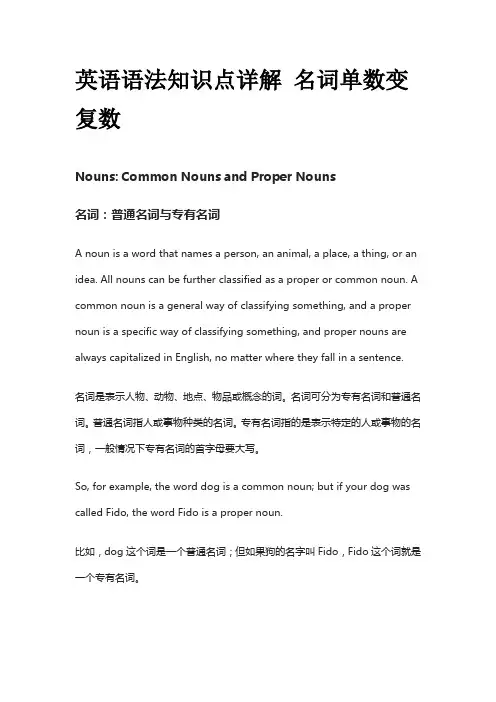
英语语法知识点详解名词单数变复数Nouns: Common Nouns and Proper Nouns名词:普通名词与专有名词A noun is a word that names a person, an animal, a place, a thing, or an idea. All nouns can be further classified as a proper or common noun. A common noun is a general way of classifying something, and a proper noun is a specific way of classifying something, and proper nouns are always capitalized in English, no matter where they fall in a sentence.名词是表示人物、动物、地点、物品或概念的词。
名词可分为专有名词和普通名词。
普通名词指人或事物种类的名词。
专有名词指的是表示特定的人或事物的名词,一般情况下专有名词的首字母要大写。
So, for example, the word dog is a common noun; but if your dog was called Fido, the word Fido is a proper noun.比如,dog这个词是一个普通名词;但如果狗的名字叫Fido,Fido这个词就是一个专有名词。
★My favorite newspaper (common noun) is the WashingtonPost (proper noun).★Her husband (common noun) is called Frank (proper noun).★The award-winning Babe Ruth (proper noun) is the greatest baseball player (common noun) in history.Concrete Nouns and Abstract Nouns:具体名词与抽象名词:◆Concrete Nouns are nouns that can be physically experienced through taste, touch, sight, hearing, or smell.具体名词是通过五感可以看到或接触到的名词,如book, tree, water, sand, pen, house, sugar, phone, cloud, petrol, boy, girl, teacher, student等。
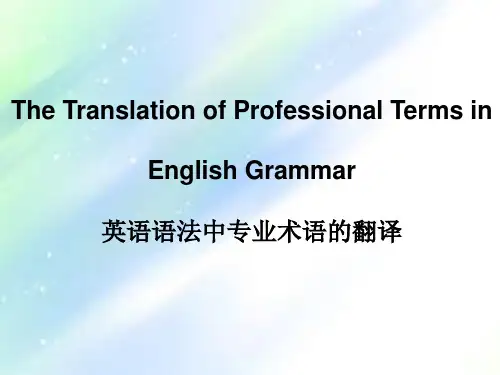
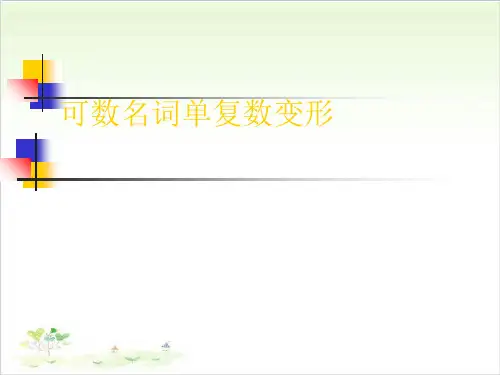
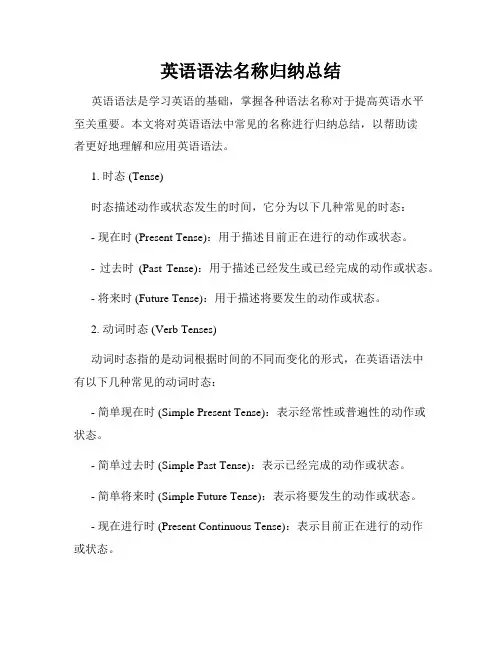
英语语法名称归纳总结英语语法是学习英语的基础,掌握各种语法名称对于提高英语水平至关重要。
本文将对英语语法中常见的名称进行归纳总结,以帮助读者更好地理解和应用英语语法。
1. 时态 (Tense)时态描述动作或状态发生的时间,它分为以下几种常见的时态:- 现在时 (Present Tense):用于描述目前正在进行的动作或状态。
- 过去时(Past Tense):用于描述已经发生或已经完成的动作或状态。
- 将来时 (Future Tense):用于描述将要发生的动作或状态。
2. 动词时态 (Verb Tenses)动词时态指的是动词根据时间的不同而变化的形式,在英语语法中有以下几种常见的动词时态:- 简单现在时 (Simple Present Tense):表示经常性或普遍性的动作或状态。
- 简单过去时 (Simple Past Tense):表示已经完成的动作或状态。
- 简单将来时 (Simple Future Tense):表示将要发生的动作或状态。
- 现在进行时 (Present Continuous Tense):表示目前正在进行的动作或状态。
- 过去进行时 (Past Continuous Tense):表示过去某个时间正在进行的动作或状态。
- 将来进行时 (Future Continuous Tense):表示将来某个时间正在进行的动作或状态。
- 完成时态 (Perfect Tenses):表示过去某个时间之前完成的动作或状态。
- 现在完成时 (Present Perfect Tense):表示过去某个时间之前完成的动作或状态,与当前时间有关。
- 过去完成时 (Past Perfect Tense):表示过去某个时间之前完成的动作或状态,与过去时间有关。
- 将来完成时 (Future Perfect Tense):表示将来某个时间之前完成的动作或状态,与将来时间有关。
3. 语态 (Voice)语态描述动作的主体和受体之间的关系,常见的语态有以下两种:- 主动语态 (Active Voice):表示动作的执行者是主语。
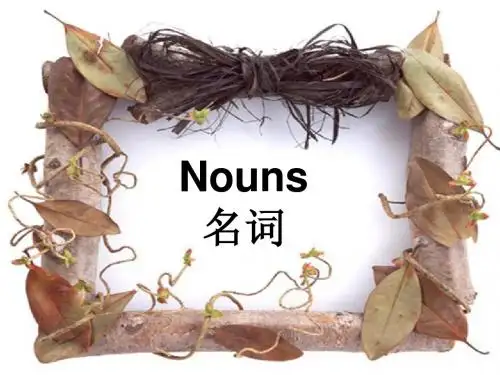
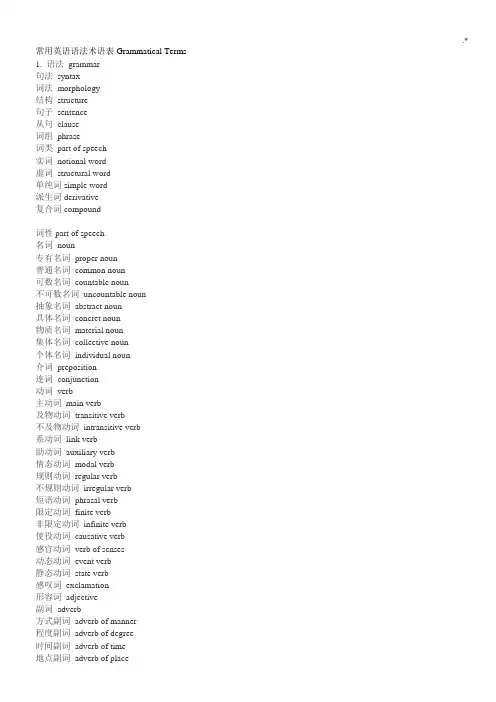
常用英语语法术语表Grammatical Terms 1. 语法grammar句法syntax词法morphology结构structure句子sentence从句clause词组phrase词类part of speech实词notional word虚词structural word单纯词simple word派生词derivative复合词compound词性part of speech名词noun专有名词proper noun普通名词common noun可数名词countable noun不可数名词uncountable noun抽象名词abstract noun具体名词concret noun物质名词material noun集体名词collective noun个体名词individual noun介词preposition连词conjunction动词verb主动词main verb及物动词transitive verb不及物动词intransitive verb系动词link verb助动词auxiliary verb情态动词modal verb规则动词regular verb不规则动词irregular verb短语动词phrasal verb限定动词finite verb非限定动词infinite verb使役动词causative verb感官动词verb of senses动态动词event verb静态动词state verb感叹词exclamation形容词adjective副词adverb方式副词adverb of manner程度副词adverb of degree时间副词adverb of time地点副词adverb of place修饰性副词adjunct连接性副词conjunct疑问副词interogative adverb关系副词relative adverb代词pronoun人称代词personal pronoun物主代词possesive pronoun反身代词reflexive pronoun相互代词reciprocal pronoun指示代词demonstrative pronoun疑问代词interrogative pronoun关系代词relative pronoun不定代词indefinite pronoun物主代词possecive pronoun名词性物主代词nominal possesive prnoun形容词性物主代词adjectival possesive pronoun冠词article定冠词definite article不定冠词indefinite article数词numeral基数词cardinal numeral序数词ordinal numeral分数词fractional numeral形式form单数形式singular form复数形式plural form限定动词finite verb form非限定动词non-finite verb form原形base form2.morphology词法notional实词form word虚词word-building构词法root词根prefix前缀suffix后缀synonym同义词antonym反义词conversion转化法derivation派生法affixation词缀法composition合成法compound复合词parts of speech词类noun名词pronoun代词numeral数词adjective形容词verb动词adverb副词article冠词preposition介词conjunction连词interjection感叹词particle引导词classification of nouns名词的分类common noun普通名词proper noun专有名词collective noun集合名词material noun物质名词abstract noun抽象名词countable noun可数名词personal pronoun人称代词possessive pronoun物主代词reflexive pronoun反身代词demonstrative pronoun指示代词interrogative pronoun疑问代词relative pronoun关系代词indefinite pronoun不定代词reciprocal pronoun相互代词case格nominative case主格objective case宾格possessive case所有格singular form单数形式plural form复数形式cardinal numeral基数词ordinal numeral序数词fraction numeral分数数词degrees of comparison比较级positive degree原级comparative degree比较级superlative degree最高级notional verb实义动词modal verb情态动词link verb连系动词auxiliary verb助动词transitive verb及物动词intransitive verb不及物动词regular verb规则动词irregular verb不规则动词finite verb限定动词non-finite verb非限定动词person人称number数gender性tense时态voice语态mood语气principal forms of verbs动词的主要形式present form现在形式past form过去形式participle分词present participle现在分词past participle过去分词infinitive不定式gerund动名词verbal noun动名词simple present tense一般现在时simple past tense一般过去时simple future tense一般将来时present continuous tense现在进行时past continuous tense过去进行时future continuous tense将来进行时past perfect tense过去完成时future perfect tense将来完成时present perfect continuous tense现在完成进行时future perfect continuous tense将来完成进行时sequence of tenses时态的呼应passive voice被动语态active voice主动语态indicative mood陈述语气imperative mood祈使语气subjunctive mood虚拟语气adverb of time 时间副词adverb of place地点副词adverb of manner方式副词adverb of degree程度副词adverb of frequency频度副词conjunctive adverb连接副词definite article定冠词indefinite article不定冠词coordinating conjunction并列连词subordinating conjunction从属连词syntax句法declarative sentence陈述句imperative sentence祈使句exclamatory sentence感叹句interrogative sentence疑问句general question一般疑问句special question特殊疑问句alternative question选择疑问句disjunctive question反意疑问句simple sentence简单句compound sentence并列句语法术语Grammar Terms 语法grammar句法syntax词法morphology结构structure句子sentence从句clause词组phrase词类part of speech实词notional word虚词structural word名词noun专有名词proper noun普通名词common noun可数名词countable noun不可数名词uncountable noun抽象名词abstract noun具体名词concrete noun物质名词material noun集体名词collective noun个体名词individual noun介词preposition连词conjunction动词verb主动词main verb及物动词transitive verb不及物动词intransitive verb系动词link verb助动词auxiliary verb情态动词modal verb规则动词regular verb不规则动词irregular verb短语动词phrasal verb限定动词finite verb非限定动词infinite verb使役动词causative verb感官动词verb of senses动态动词event verb静态动词state verb感叹词exclamation形容词adjective副词adverb方式副词adverb of manner程度副词adverb of degree时间副词adverb of time地点副词adverb of place修饰性副词adjunct连接性副词conjunct疑问副词interrogative adverb关系副词relative adverb代词pronoun人称代词personal pronoun物主代词possessive pronoun反身代词reflexive pronoun相互代词reciprocal pronoun指示代词demonstrative pronoun疑问代词interrogative pronoun关系代词relative pronoun不定代词indefinite pronoun名词性物主代词nominal possessive pronoun形容词性物主代词adjectival possessive pronoun冠词article定冠词definite article不定冠词indefinite article数词numeral基数词cardinal numeral序数词ordinal numeral分数词fractional numeral形式form单数形式singular form复数形式plural form限定动词finite verb form非限定动词non-finite verb form原形base form从句clause从属句subordinate clause并列句coordinate clause名词从句nominal clause定语从句attributive clause状语从句adverbial clause宾语从句object clause主语从句subject clause同位语从句appositive clause时间状语从句adverbial clause of time地点状语从句adverbial clause of place方式状语从句adverbial clause of manner让步状语从句adverbial clause of concession原因状语从句adverbial clause of cause结果状语从句adverbial clause of result目的状语从句adverbial clause of purpose条件状语从句adverbial clause of condition真实条件状语从句adverbial clause of real condition非真实条件状语从句adverbial clause of unreal condition 含蓄条件句adverbial clause of implied condition错综条件句adverbial clause of mixed condition句子sentence简单句simple sentence并列句compound sentence复合句complex sentence并列复合句compound complex sentence陈述句declarative sentence疑问句interrogative sentence一般疑问句general question特殊疑问句special question选择疑问句alternative question附加疑问句tag question反义疑问句disjunctive question修辞疑问句rhetorical question感叹疑问句exclamatory question存在句existential sentence肯定句positive sentence否定句negative sentence祈使句imperative sentence省略句elliptical sentence感叹句exclamatory sentence基本句型basic sentence pattern句子成分members of sentences主语subject谓语predicate宾语object双宾语dual object直接宾语direct object间接宾语indirect object复合宾语complex object同源宾语cognate object补语complement主补subject complement宾补object complement表语predicative定语attribute同位语appositive状语adverbial句法关系syntactic relationship并列coordinate从属subordination修饰modification前置修饰pre-modification后置修饰post-modification限制restriction双重限制double-restriction非限制non-restriction数number单数形式singular form复数形式plural form规则形式regular form不规则形式irregular form格case普通格common case所有格possessive case主格nominative case宾格objective case性gender阳性masculine阴性feminine通性common中性neuter人称person第一人称first person第二人称second person第三人称third person时态tense过去将来时past future tense过去将来进行时past future continuous tense过去将来完成时past future perfect tense一般现在时present simple tense一般过去时past simple tense一般将来时future simple tense现在完成时past perfect tense过去完成时present perfect tense将来完成时future perfect tense现在进行时present continuous tense过去进行时past continuous tense将来进行时future continuous tense过去将来进行时past future continuous tense现在完成进行时present perfect continuous tense 过去完成进行时past perfect continuous tense语态voice主动语态active voice被动语态passive voice语气mood陈述语气indicative mood祈使语气imperative mood虚拟语气subjunctive mood否定negation否定范围scope of negation全部否定full negation局部否定partial negation转移否定shift of negation语序order自然语序natural order倒装语序inversion全部倒装full inversion部分倒装partial inversion直接引语direct speech间接引语indirect speech自由直接引语free direct speech自由间接引语free indirect speech一致agreement主谓一致subject-predicate agreement 语法一致grammatical agreement概念一致notional agreement就近原则principle of proximity强调emphasis重复repetition语音pronunciation语调tone升调rising tone降调falling tone降升调falling-rising tone文体style正式文体formal非正式文体informal口语spoken/oral English感情色彩emotional coloring褒义commendatory贬义derogatory幽默humorous讽刺sarcastic挖苦ironic。
English grammar terms often used英语语法常用词语1.Parts of speech noun 名词verb动词conjunction 连词词类pronoun 代词adverb 副词interjection 惋惜词numeral 数词article冠词particle 小品词adjective 形容词preposition介词2. Word building conversion 转变suffix 后缀构词法derivation派生compound words 合成词affixation词缀法prefix前缀3. Classification of nouns名词的分类common nouns一般名词individual nouns 个体名词material nouns 物质名词countable nouns 可数名词the singular form 单数形式the common case一般格the subjective case主格person 人称proper nouns 专有名词collective nouns 会集名词abstract nouns 抽象名词uncountable nouns不可以数名词the plural form 复数形式the possessive case所有格the objective case 宾格third person singular 第三人称单数4. Classification of pronouns代词的分类personal pronouns 人称代词self pronouns 反身代词interrogative pronouns 疑问代词relative pronouns 关系代词indefinite pronouns 不定代词possessive pronouns物主代词demonstrative pronouns 指示代词conjunctive pronouns 连接代词reciprocal pronouns 相互代词5.数词、形容词、冠词cardinal numerals 基数词fractional numerals 分数词the superlative degree最高等the indefinite article不定冠词ordinal numerals 序数词the comparative degree比较级The definite article 定冠词6.Classification of verbs动词的分类national verbs 实义动词auxiliary verbs 助动词transitive verbs 及物动词regular verbs 规则动词the present forms 现在式the participle 分词the past participle 过去分词the gerund 动名词link-verbs 系动词modal verbs神情动词intransitive verbs 不及物动词irregular verbs 不规则动词the past forms 过去式the present participle现在分词the infinitive 不定式bare infinitive 不带 to 的不定式7.Tense 时态the present tense一般现在时the future tense一般将来时the present continuous现在进行时the future continuous 将来进行时the present perfect 现在完成时the future perfect 将来完成时the past tense 一般过去时the past future tense一般过去将来时the past continuous 过去进行时the past future continuous过去将来进行时the past perfect过去完成时the past future perfect 过去将来完成时the present perfect continuous现在完成进行时the future perfect continuous 将来完成进行时the past future perfect continuous 过去将来完成进行时8.Voice 语态、 Mood 语气the passive voice 被动语态the indicative mood 陈述语气the subjunctive mood 虚假语气the active voice 主动语态the imperative mood 祈使语气9.Classification of adverbs副词的分类adverbs of place 地点副词adverbs of time 时间副词adverbs of degree程度副词adverbs of manner 方式副词adverbs of frequency频度副词relative adverbs 关系副词interrogative adverbs 疑问副词conjunctive adverbs连接副词10. Members of the sentence 句子成分the subject 主语the predicate 谓语the predicative 表语the object the attribute 定语the adverbial 状语the appositive 同位语independent elements独立成分the direct object 直接宾语the indirect object 间接宾语parenthesis 插入语the double possessive 双重所有格the formal subject/object 形式主语subject complement 主语补足语object complement宾语补足语宾语/宾语11. Classification of sentences句子的分类declarative sentences陈述句exclamatory sentences惋惜句general questions 一般疑问句alternative questions选择疑问句 tap questions 附加疑问句compound sentences复合句elliptical sentences 省略句infinitive phrases 不定式短语imperative sentences 祈使句interrogative sentences 疑问句special questions 特别疑问句disjunctive questions 反意疑问句simple sentences简单句complex sentences并列句phrase 短语preposition phrases 介词短语the question word 疑问词12.Clauses 从句 mainclauses 主句 object clauses宾语从句subject clauses 主语从句direct speech 直接引语indirect speech 间接引语predicate clauses谓语从句predicative clauses 表语从句attributive clauses定语从句restrictive attributive clauses 限定性定语从句the antecedent 先行词non-restrictive attributive clauses 非限制性定语从句appositive clauses同位语从句adverbial clauses状语从句adverbial clauses oftime/ place / cause / condition / degree/ result / concession / purpose / comparison /manner 时间 / 地点 / 原因 / 条件 / 程度 / 结果 / 退步 / 目的 / 比较 / 方式状语从句sentences of real condition 真实条件句sentences of unreal condition 虚假条件句natural word-order 自然语序inverted word-order 倒装语序full inversion 完满倒装partial inversion 部分倒装ellipsis 省略transformation of sentences句型变换analysis of sentences句子解析13. Punctuation标点符号period/full stop 句号comma逗号semicolon 分号colon 冒号dash 破折号hyphen 连字号brackets 括号question mark问号quotation marks引号apostrophe 省略号14.The pronunciation of English英语发音international phonetic 国际音标the sounds of English 英语语音vowels 元音pure vowels 单元音diphthongs 双元音semi-vowel 半元音consonants 辅音nasal 鼻音plosive 爆破音fricative 磨擦音affricate 破擦音voiced sounds浊音voiceless 清音length mark 长音符号stress 重读main stress 主重读音节secondary stress次重读音节unstressed 非重读音节rhythm 节奏rising tune 升调intonationfalling tune语调降调a level pitch平调。
英语语法专业术语语法grammar句法syntax词法morphology结构structure层次rank句子sentence从句clause词组phrase词类part of speech单词word实词notional word虚词structural word名词noun专有名词proper noun普通名词common noun 可数名词countable noun 不可数名词uncountable no 抽象名词abstract noun具体名词concrete noun物质名词material noun集体名词collective noun个体名词individual noun介词preposition连词conjunction动词verb主动词main verb及物动词transitive verb不及物动词intransitive verb 系动词link verb助动词auxiliary verb情态动词modal verb规则动词regular verb不规则动词irregular verb 短语动词phrasal verb限定动词finite verb非限定动词infinite verb使役动词causative verb感官动词verb of senses动态动词event verb静态动词state verb感叹词exclamation形容词adjective副词adverb方式副词adverb of manner程度副词adverb of degree时间副词adverb of time地点副词adverb of place修饰性副词adjunct连接性副词conjunct疑问副词interrogative adverb关系副词relative adverb代词pronoun人称代词personal pronoun物主代词possessive pronoun反身代词reflexive pronoun相互代词reciprocal pronoun指示代词demonstrative pronoun疑问代词interrogative pronoun关系代词relative pronoun不定代词indefinite物主代词possessive pronoun名词性物主代词nominal possessive形容词性物主代词adjectival possessive pronoun冠词article定冠词definite article不定冠词indefinite article数词numeral基数词cardinal numeral序数词ordinal numeral分数词fractional numeral形式form单数形式singular form复数形式plural form限定动词finite verb form非限定动词non-finite verb form原形base form从句clause从属句subordinate clause并列句coordinate clause名词从句nominal clause定语从句attributive clause状语从句adverbial clause宾语从句object clause主语从句subject clause同位语从句appositive clause时间状语从句adverbial clause of time地点状语从句adverbial clause of place方式状语从句adverbial clause of manner让步状语从句adverbial clause of concession原因状语从句adverbial clause of cause结果状语从句adverbial clause of result目的状语从句adverbial clause of purpose条件状语从句adverbial clause of condition真实条件状语从句adverbial clause of real condition非真实条件状语从句adverbial clause of unreal condition 含蓄条件句adverbial clause of implied condition错综条件句adverbial clause of mixed condition句子sentence简单句simple sentence并列句compound sentence复合句complex sentence并列复合句compound complex sentence陈述句declarative sentence疑问句interrogative sentence一般疑问句general question特殊疑问句special question选择疑问句alternative question附加疑问句tag question反义疑问句disjunctive question修辞疑问句rhetorical question感叹疑问句exclamatory question存在句existential sentence肯定句positive sentence否定句negative sentence祈使句imperative sentence省略句elliptical sentence感叹句exclamatory sentence基本句型basic sentence pattern句子成分members of sentences 主语subject谓语predicate宾语object双宾语dual object直接宾语direct object间接宾语indirect object复合宾语complex object同源宾语cognate object补语complement主补subject complement宾补object complement表语predicative定语attribute同位语appositive状语adverbial句法关系syntactic relationship 并列coordinate从属subordination修饰modification前置修饰pre-modification 后置修饰post-modification 限制restriction双重限制double-restriction 非限制non-restriction数number单数形式singular form复数形式plural form规则形式regular form不规则形式irregular form格case普通格common case所有格possessive case主格nominative case宾格objective case性gender阳性masculine阴性feminine通性common中性neuter人称person第一人称first person第二人称second person第三人称third person时态tense过去将来时past future tense过去将来进行时past future continuous tense 过去将来完成时past future perfect tense一般现在时present simple tense一般过去时past simple tense一般将来时future simple tense现在完成时past perfect tense过去完成时present perfect tense将来完成时future perfect tense现在进行时present continuous tense过去进行时past continuous tense将来进行时future continuous tense过去将来进行时past future continuous tense现在完成进行时present perfect continuous tense 过去完成进行时past perfect continuous tense语态voice主动语态active voice被动语态passive voice语气mood陈述语气indicative mood祈使语气imperative mood虚拟语气subjunctive mood否定negation否定范围scope of negation全部否定full negation局部否定partial negation转移否定shift of negation语序order自然语序natural order倒装语序inversion全部倒装full inversion部分倒装partial inversion直接引语direct speech间接引语indirect speech自由直接引语free direct speech自由间接引语free indirect speech一致agreement主谓一致subject-predicate agreement 语法一致grammatical agreement概念一致notional agreement就近原则principle of proximity强调emphasis重复repetition语音pronunciation语调tone升调rising tone降调falling tone降升调falling-rising tone文体style正式文体formal非正式文体informal口语spoken/oral English套语formulistic expression英国英语British English美国英语American English用法usage感情色彩emotional coloring褒义commendatory贬义derogatory幽默humorous讽刺sarcastic挖苦ironic动名词gerund连字号hyphen祈使语气imperative mood祈使句imperative sentences独立成分indefinite case主句indicative mood物质名词material nouns句子的成分members of the sentence 情态动词modal verbs语气mood词法morphology否定疑问句negative interrogative sentence动词的非限定形式non-finite forms of the verb非限制性定语从句non-restrictive attributive clauses 括号brackets名词的分类classification of nouns从句(分句)clauses同源宾语cognate object集体名词collective nouns冒号colon逗号comma普通格common case普通名词common nouns比较级comparative degree复合宾语complex Object复合句complex sentences并列复合句compound complex sentences表性状的复合谓语compound nominal predicate复合谓语compound predicate并列句compound sentences表行为的复合谓语compound verbal predicate合成词compound words合成compounding ( composition )错综时间条件句conditional sentences of mixed time 连词conjunction连接副词conjunctive adverbs连接代词conjunctive pronouns转化conversion并列连词co-coordinating conjunctions可数名词countable nouns破折号dash陈述句declarative sentences定冠词definite article比较的级别degrees of comparison指示代词demonstrative pronouns派生(词缀法)derivation ( affixation )描绘性定语descriptive attributes呼语direct address直接宾语direct object直接引语direct speech反意问句disjunctive questions省略ellipsis省略句elliptical sentences感叹号exclamation mark感叹句exclamatory sentences动词的限定形式finite forms of the verb虚词form words分数词fractional numerals完全倒装full inversion将来进行时future continuous一般将来时future indefinite将来完成时future perfect将来完成进行时future perfect continuous独立结构absolute constructions物主代词的绝对形式absolute forms of possessive pronouns 抽象名词abstract nouns主动语态active voice方式状语从句adverbial clauses of manner地点状语从句adverbial clauses of place目的状语从句adverbial clauses of purpose时间状语从句adverbial clauses of time程度副词adverbs of degree频度副词adverbs of frequency方式副词adverbs of manner地点副词adverbs of place时间副词adverbs of time选择问句alternative questions 句子分析analysis of sentences 省略号apostrophe同谓语appositive同位语从句appositive clauses 助动词auxiliary verbs插入语parenthesis部分倒装partial inversion分词短语participial phrases 分词participle小品词particle词类parts of speech过去式past forms过去分词past participle句号period ( full stop )人称person人称代词personal pronouns 成语动词phrasal verbs谓语predicate表语predicative表语从句predicative clauses前缀prefix(es)介词短语prepositional phrases现在式present forms现在分词present participle动词的主要形式principal forms of verbs专有名词proper nouns标点符号punctuation问号question mark引号quotation mark相互代词reciprocal pronouns不定代词indefinite Pronouns关系副词relative adverbs关系代词relative pronouns限制性定语从句restrictive attributive clauses 自身代词self pronouns分号semicolon真实条件句sentences of real condition虚拟条件句sentences of unreal condition时态的呼应sequence of tenses特殊问句special questions虚拟语气subjunctive mood后缀suffix(es)最高级superlative degree句法syntax句型的转换transformation of sentences 双部句two-member sentences不可数名词uncountable nouns动词短语verbal phrases名词化的动词verbal noun构词法word building。
IntroductionTwo students are talking in the classroom..Maggie: What did you see in Mei Po Marshes?Sam : I saw some rare birds there. They were eating fish. I also saw some frogs in the eater.Maggie: What other animals can you see in marches?Sam : We can see butterflies and snails. Sometimes we also see bats and snakes.Maggie: It must be fun!Sam : Yes, but I got too close to the pond and my feet got stuck in the mud.My shoes became so dirty that my mum was very upset.Grammar PointA.名词一般可分为两类:普通名词common nouns和专有名词proper nouns。
有学者再根据事物的物质列出以下三种:物质名词material nouns、集合名词collective nouns和抽象名词abstract nouns。
1.普通名词common nouns平常使用的名词,例如:‘hen, duck, pen, desk, student’等。
E.g. A duck is swimming in the pond.Macy bought some bread yesterday.2.专有名词proper nouns人、地、物的专用名词。
例如:‘John, Mary, China, England, Disneyland’等。
1. The absence of a determiner before plural countable nouns The absence of a determiner before plural countable nouns generally has the same significance as the presence of a or an before singular countable nouns.
a. Making a general statement When used in general statements, plural countable nouns are usually not preceded by determiners. The plural countable nouns in the following general statements are underlined. e.g. Musicians must practise a great deal. Newspapers can contain valuable information. Larches are conifers.
A general idea can often be expressed either by means of a singular countable noun preceded by a or an, or by means of a plural countable noun not preceded by a determiner. For instance, in each of the following pairs of sentences, both sentences in the pair have the same meaning. Musicians must practise a great deal. A musician must practise a great deal.
Newspapers can contain valuable information. A newspaper can contain valuable information.
Larches are conifers. A larch is a conifer.
See Exercises 1, 2, 3 and 4. b. Referring to something not mentioned before Plural countable nouns are generally not preceded by a determiner when referring to something not mentioned before. e.g. Branches blocked our path. Clouds were gathering overhead. Suddenly we saw buildings in front of us. In these examples, the plural nouns branches, clouds and buildings are not preceded by determiners. It is assumed that the branches, clouds and buildings have not been referred to previously. c. Naming a profession When a sentence such as the following is used to name a profession practised by two or more people, the name of the profession is in the plural and is not preceded by a determiner. e.g. They are doctors. My friends are electricians. We were chefs.
2. The use of The before plural countable nouns a. Referring to something mentioned before In general, the has the same meaning when used with plural countable nouns as when used with singular countable nouns. For instance, the is used with plural countable nouns when referring to something which has been mentioned before. e.g. Fallen leaves covered the ground. The leaves rustled as we walked. In the orchard were apples and pears. The apples were nearly ripe. The doors opened, and students and teachers began leaving the building. The students were talking and laughing. In these examples, the first time the words leaves, apples and students appear, they are not preceded by determiners, because the things referred to have not been mentioned previously. The second time the words leaves, apples and students appear, they are preceded by the, since the things referred to have already been mentioned.
See Exercise 5. b. Referring to something when it is considered obvious what is meant The is used with plural countable nouns when the speaker or writer considers it obvious which particular persons or things are meant. e.g. The stars are shining brightly. The roses are blooming. We have put the children to bed. I was sitting on the front steps.
These sentences give examples of the use of the to refer to things which are particularly important to the speaker or writer. The expression the stars usually refers to the stars which can be seen from the part of the earth where one lives. The expression the roses might refer to roses in one's own garden, or to roses in which one feels a particular interest. The children might refer to one's own children or to children for whom one is responsible. The front steps might refer to the front steps of one's own house.
c. Names of nationalities The is sometimes used with the name of a nationality in order to make a general statement about the people of that nationality. A plural verb must be used in such a statement.
When the name of a nationality ends in the sound of ch, s, sh or z, the name of the nationality must usually be preceded by the.
Nationality Example French The French are famous for their fine wines. Irish The Irish are known as poets and songwriters.
When the name of a nationality does not end in the sound of ch, s, sh or z, the letter s must be added to the end of the name when it is